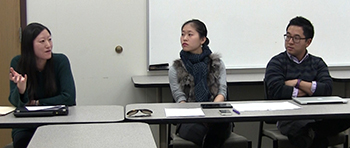VARC Convenes Roundtable to Evaluate PISA
DECEMBER 2013
 On Tuesday, Dec. 10, the Value-Added Research Center convened a staff roundtable discussion to review the results of the 2012 Programme for International Student Assessment (PISA).
On Tuesday, Dec. 10, the Value-Added Research Center convened a staff roundtable discussion to review the results of the 2012 Programme for International Student Assessment (PISA).
More than a dozen researchers attended VARC’s roundtable, which focused on the relevance of the PISA exam to VARC’s work on using value added, growth measures, and analytics to provide guidance to improve student learning. The discussion focused on gaining a deeper understanding of the PISA, and interpreting the results and determining their value.
The PISA exam, managed and developed by the Organisation for Economic Co-operation and Development, has the primary goal of comparing the educational attainment of 15-year-olds in countries around the world. The test covers math, reading, and science and is administered every three years. On its website, the test is described as “the world’s premier yardstick for evaluating the quality, equity and efficiency of school systems.”
VARC’s discussion featured research associate Yang Caroline Wang, who works on assessment-related issues in value-added analysis, and who previously worked at the Division for the Civil Servant Exam and Personnel Assessment in Beijing; policy analyst HeeJin Kim, who works in statistical programming, model development, and data quality for VARC and who studied South Korea’s participation in PISA as part of her graduate studies; and econometrician David Kang, who researches short-cycle value added.
